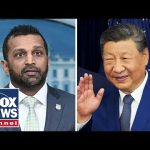In a bold move, the Trump administration has put Venezuela on high alert as the Pentagon initiates Operation Southern Spear, an ambitious effort aimed at dismantling narco-terrorist networks throughout Latin America. The strategic deployment of U.S. forces includes an impressive 25% of all U.S. warships currently stationed in the Caribbean, underscoring the seriousness of this operation. Among these vessels is the USS Gerald Ford, the newest and largest aircraft carrier in the Navy, joined by a fleet of guided missile destroyers, including the USS Lake Erie and the USS Iwo Jima. This maritime formation has gathered just off the coast of Venezuela, showcasing U.S. military might in a region plagued by drug trafficking and corruption.
As Operation Southern Spear ramps up, the U.S. military has also mobilized B-52 bombers in Louisiana and F-35 fighter jets in Puerto Rico. These state-of-the-art aircraft will add firepower to the operation, which has already seen multiple strikes against suspected drug smuggling vessels in the Caribbean. The goal is clear: to combat the efforts of narco-terrorists who have been making the waters unsafe for innocent citizens while profiting from the drug trade. The U.S. military’s readiness is evident, with a significant fleet positioned to respond to any directives from the Commander in Chief.
Military analysts suggest that the operation is not only about striking drug shipments but also about applying pressure on the Maduro regime, which has been accused of enabling drug trafficking across its borders. While the U.S. aims to disrupt these narcotics networks, there are intricate geopolitical considerations to navigate. Maduro’s government is backed by nations like Russia, China, and Cuba, making a direct attack not just risky but potentially disastrous. Any military action will likely be targeted at drug cartels, avoiding direct confrontation with Maduro’s forces, which could escalate tensions further.
Operation Southern Spear appears to serve a dual purpose: it aims to stifle drug trafficking while possibly creating conditions for changing Venezuela’s leadership in a more peaceful fashion. The U.S. government seems to hope that by showcasing its military strength, it will encourage military leaders around Maduro to reconsider their loyalty to him. However, skepticism remains regarding the effectiveness of this strategy, with experts predicting that even increased pressure may not be sufficient to dislodge Maduro from power.
Meanwhile, the excitement isn’t just limited to Venezuela. This week, President Trump is expected to host Saudi Crown Prince Mohammed bin Salman, with the potential for significant geopolitical discussions. Analysts speculate that the conversations could lead to greater normalization between Saudi Arabia and Israel, enhancing stability in the Middle East. Nevertheless, the question remains whether tangible progress will be made, especially given the complex dynamics at play. Saudi Arabia’s role in the Islamic community, particularly as the home of Mecca, adds an extra layer of significance to these discussions.
In conclusion, as Operation Southern Spear sets the stage for potential military actions in Latin America, the international community watches with bated breath. The stakes are high, and the involvement of multiple nations indicates that this is about more than just local drug trade; it strikes at the heart of U.S. foreign policy goals. Whether through military might or diplomatic negotiations, the Trump administration is preparing for a showdown in Venezuela, with the hope of restoring order in a nation struggling to break free from the grips of narco-terrorism.




